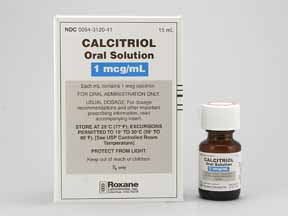
Rocaltrol Coupons & Savings Card – Discount Prices from $55.94
Brand for: Calcitriol
My prescription
Edit
15ML of 1MCG/ML, Calcitriol (1 Bottle)
Select pharmacy

CVS
$73.33
COUPON PRICE
Walgreens
$55.94
COUPON PRICE
Albertsons
$94.15
COUPON PRICE
Walmart
$102.98
COUPON PRICERocaltrol savings card
Show this card to your pharmacist
Walgreens
$55.94
BIN
ID
PCN
GRP
011867
LHF741822F
HT
LABH001
Powered by
Related vitamin D analogues prescriptions
More prescriptions for hyperparathyroidism
Related vitamin D analogues prescriptions
More prescriptions for hyperparathyroidism
Rocaltrol (Calcitriol) dosage forms
Dosage Quantity Price from Per unit 15ML 1 Bottle $86.43 $86.43 15ML 2 Bottles $154.56 $77.28 15ML 3 Bottles $230.69 $76.90
| Dosage | Quantity | Price from | Per unit |
|---|---|---|---|
| 15ML | 1 Bottle | $86.43 | $86.43 |
| 15ML | 2 Bottles | $154.56 | $77.28 |
| 15ML | 3 Bottles | $230.69 | $76.90 |
Rocaltrol Warnings
The following safety information outlines the potential risks and precautions associated with the use of this medication. Please read carefully and discuss any concerns with your healthcare provider.
Overdose Risks: Calcitriol (Rocaltrol) is a highly potent form of vitamin D. Excessive intake can lead to elevated calcium levels in the blood, posing a danger to your kidneys and blood vessels. To prevent this, maintain a consistent intake of calcium, whether through diet or supplements. Be vigilant for signs of high calcium levels, such as a metallic taste, dry mouth, muscle or bone pain, or headaches. If these symptoms occur, inform your healthcare provider immediately. They may conduct tests to assess your calcium levels and initiate treatment if necessary. High calcium intake is a significant risk factor.
Drug Interactions: Calcitriol (Rocaltrol) may interact with various medications, including ketoconazole, cholestyramine (Prevalite), corticosteroids, phosphate binders, magnesium-containing supplements or antacids, and diuretics like hydrochlorothiazide. These interactions can modify the levels of calcitriol, vitamin D, calcium, or other electrolytes in your body. Ensure all your healthcare providers are informed about all medications and supplements you are taking to enable them to adjust dosages appropriately.
Contraindications: This medication is not recommended for individuals with elevated levels of calcium or vitamin D, as it can lead to serious health complications. If this applies to you, consult your healthcare provider before starting the medication.
Should you have any questions or require further clarification, do not hesitate to reach out to your healthcare professional.
Rocaltrol Side Effects
Calcitriol is generally well-tolerated, and most individuals do not experience significant side effects. However, some common side effects may occur, which are usually mild and temporary. These include headache, weakness, fatigue, stomach upset, nausea, vomiting, constipation, loss of appetite, muscle or bone pain, dry mouth, and a metallic taste. If any of these symptoms persist or worsen, consulting a healthcare provider is advisable. In rare instances, more serious side effects can occur and require immediate medical attention. These include allergic reactions characterized by rash, itching, hives, and swelling of the face, lips, tongue, or throat, which could lead to trouble breathing. Heart rhythm changes such as a fast or irregular heartbeat, dizziness, or chest pain are also serious concerns. High calcium levels might manifest as increased thirst, excessive urination, nausea, vomiting, confusion, unusual fatigue, or bone pain. Elevated phosphorus levels can cause muscle pain, joint pain, or numbness and tingling around the mouth. While these severe side effects are uncommon, it is crucial to remain vigilant and seek medical help if they arise. Always discuss any concerning symptoms with your healthcare provider to ensure appropriate management and care.
Rocaltrol Interactions
What is Rocaltrol prescribed for?
Rocaltrol is prescribed for the management of conditions related to calcium metabolism, such as hypocalcemia in patients undergoing chronic renal dialysis, and for the treatment of secondary hyperparathyroidism in patients with chronic kidney disease. It is also used in certain cases of hypoparathyroidism and vitamin D-resistant rickets.
What is the major side effect of calcitriol?
The major side effect of calcitriol is hypercalcemia, which is an elevated level of calcium in the blood. This can lead to symptoms such as nausea, vomiting, weakness, and confusion. It is important for patients taking calcitriol to have their calcium levels monitored regularly.
What are the most common adverse reactions for calcitriol?
The most common adverse reactions associated with calcitriol include hypercalcemia, which can lead to symptoms such as weakness, headache, nausea, vomiting, dry mouth, constipation, muscle pain, and metallic taste. It is important for patients to have their calcium levels monitored regularly while taking calcitriol to prevent these adverse effects.
Does calcitriol cause weight gain?
Calcitriol is not commonly associated with weight gain. However, if a patient experiences unexpected weight changes while taking calcitriol, it is advisable to consult with a healthcare provider to rule out any underlying issues or side effects.
What are the primary effects of calcitriol on the body?
Calcitriol primarily increases the levels of calcium in the blood by promoting the absorption of calcium and phosphate from the intestines. It also enhances the reabsorption of calcium in the kidneys and works with parathyroid hormone to release calcium from the bones. These actions help maintain proper bone health and calcium balance in the body.
